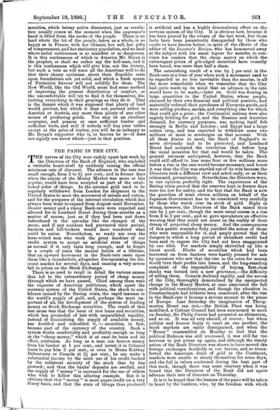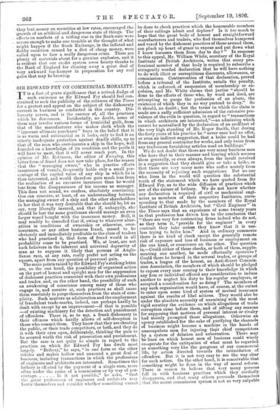THE PANIC IN THE CITY. T HE nerves of the City
were rudely upset last week by the Directors of the Bank of England, who exploded a veritable bomb-shell by suddenly raising the official minimum rate of discount. The advance in the rate was small enough, from 2 to 21- per- cent., and in former days when the course of the Money Market was more or less regular, would have been accepted as part of the estab- lished order of things. In the autumn gold used to be regularly withdrawn from London for shipment to the United States to meet the movement of cereals and cotton, and for the purposes of the internal circulation which has always been wont to expand from August until November. Dearer money and a rising Bank-rate were expected and allowed for in Lombard Street during these months as a matter of course, just as if they had been put down beforehand in the calendar like the changes of the moon, and if any accident had prevented their arrival, bankers and bill-brokers would have wondered what could be amiss. Nevertheless, so ready are even the keen-witted men who work the great machine of our credit system to accept an artificial state of things as normal if it only lasts long enough, and to forget in a, couple of years the mental habits of a lifetime, that an upward movement in the Bank-rate came upon them like a thunderbolt, altogether disorganising the dis- count market for several days, and causing a very severe fall in prices on the Stock Exchange.
There is no need to recall in detail the various causes that led to the extraordinary period of cheap money through which we have passed. Chief among them were the vagaries of American politicians, which upset the currency system of the United States, the shock to con- fidence caused by the Baring crisis, the rapid increase in the world's supply of gold, and, perhaps the most im- portant of all, the development of the system of lending money on Stock Exchange securities. The result of this last cause was that the issue of new loans and securities, which has proceeded of late with unparalleled rapidity, instead of diminishing the supply of available money, has doubled and redoubled it, — securities, in fact, became part of the currency of the country. Such a system works comfortably and profitably enough as long as the "cheap money," which is at once its basis and its effect, continues. As long as a man can borrow money from his banker at 1 per cent., and invest it in Colonial loans to pay him 3 per cent., or even in Home Railway Debentures or Consols at 21 per cent., he can make a substantial income by the mere use of his credit backed by the collateral security of the stock that he has pawned ; and thus the banks' deposits are swelled, and the supply of " money " is increased for the use of others who wish to follow this alluring example. But it is obvious that this " money " is mere paper-credit on a very flimsy basis, and that the state of things thus produced is artificial and has a highly demoralising effect on the- nervous system of the City. It is obvious now, because it has been proved by the events of the last week, but these facts have been persistently disregarded by those who ought to have known better, in spite of the efforts of the editor of the Investor's _Review, who has hammered away at the subject with his usual vigour for months, to con- vince his readers that the cheap money on which the- extravagant prices of gilt-edged securities have recently. been based, was more than half a sham.
The astonishing result of a rise by per cent. in the- Bank-rate at a time of year when such a movement used to- be regarded as no less inevitable than the sunrise, is all the more remarkable when we remember that the City. had quite made up its mind that an advance in the rate would have to be made,—later on. Gold was flowing in large quantities to the United States, whose people, alarmed by their own financial and political position, had materially reduced their purchases of European goods, and were selling produce, metals, and everything else for which they could get a price ; the Continental nations were also eagerly bidding for gold, and the Russian and Austrian demand, for currency purposes, was making itself felt strongly in Berlin and London ; and Egypt had a large cotton crop, and was expected to withdraw some two- millions or more in sovereigns on that account. With all these drains to meet, the Bank of England's re- serve obviously had to be protected, and Lombard Street had accepted the conviction that before long- the usual measures for that end would be taken. The general estimate anticipated, however, that the Bank could still afford to lose some four or five millions more before a rise in the rate would become necessary, and hence it was that the City was startled out of its wits because the Directors took a different view and acted early, or as their critics said, prematurely. Nevertheless, the Directors were, in our opinion, perfectly right. The experiences of the- Baring crisis proved that the reserves kept in former days were too low for safety, and the fact that the Bank is now- the guardian of some eleven millions on behalf of the Japanese Government has to be considered very carefully by those who watch over its stock of gold. Right or wrong, however, the Directors of the Bank raised their rate by 2 per cent., though the more usual course is a rise from 2 to 3 per cent., and so gave speculators an effective warning that they could not count on the reality of their dream of perpetual cheap money. And the consequences- of this gentle reminder fully justified the action of those who were responsible for it, and amply proved that the dangers to which a long period of abundant credit had been said to expose the City had not been exaggerated by one whit. For markets simply shrivelled up like sr burnt scroll. Blocks of securities which had been borrowed on from bankers were hastily pressed for sale by operators who saw that the rise in the rates for money- would turn their profits into losses, and the long-standing complaint of the impossibility of buying first-class stocks was turned into a new grievance,—the difficulty of selling them. Consols declined rapidly, and the nerves of the City, thoroughly demoralised by the unexpected change in the Money Market, at once associated the fall with political considerations, and though the situation in Constantinople had hitherto been unnoticed, after the rise in the Bank-rate it became a serious menace to the peace of Europe. Last Saturday the imagination of Throg- morton Street ran riot,—the British Fleet was being mobilised, a Cabinet Council had been summoned to meet on Sunday, Sir Philip Currie had presented an ultimatum, and so on. It was all very absurd, of course; but when politics and finance begin to react on one another, the ' stock markets are easily disorganised, and when the " House " reassembled on Monday to find that the political Rubicon was still uncrossed, it was still far too. nervous to put prices up again, and although the timely action of the Bank Directors was shown to have moved the foreign exchanges decidedly in our favour, and so trans- ferred the American drain of gold to the Continent, markets were unable to steady themselves for some days, and the fall in values continued during the beat part of this week, though there was some recovery when it was found that the Directors of the Bank did not again advance their rate of discount on Thursday.
It is to be hoped that the lessons of the panic will be taken to heart by the bankers, who, by the freedom with which they lent money on securities at low rates, encouraged the growth of an artificial and dangerous state of things. The effects on markets of a trifling rise in the Bank-rate were severe enough to make one tremble at the thought of what might happen if the Stock Exchange, in the inflated and flabby condition caused by a diet of cheap money, were called upon to face a really dangerous crisis. There are plenty of materials about for a genuine explosion, and it is evident that our credit system owes hearty thanks to the Bank of England for clearing away a great deal of very awkward- top-hamper in preparation for any real gales that may be brewing.



































 Previous page
Previous page